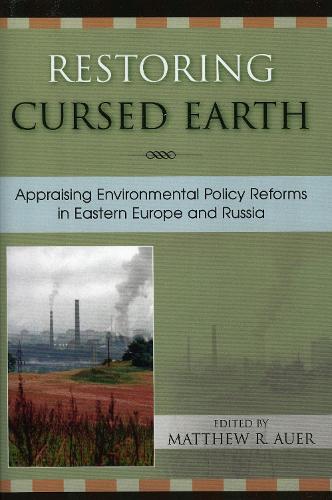
Restoring Cursed Earth: Appraising Environmental Policy Reforms in Eastern Europe and Russia
(Paperback)
Publishing Details
Restoring Cursed Earth: Appraising Environmental Policy Reforms in Eastern Europe and Russia
By (Author) Matthew R. Auer
Contributions by Joshua E. Abrams
Contributions by Matthew R. Auer
Contributions by Ruth Greenspan Bell
Contributions by Susan Legro
Contributions by M Cristina Novac
Bloomsbury Publishing PLC
Rowman & Littlefield Publishers
1st November 2005
United States
Classifications
Professional and Scholarly
Non Fiction
363.70560947
Physical Properties
Paperback
200
Width 152mm, Height 229mm, Spine 25mm
454g
Description
Among the most costly and complicated chapters in the former Eastern bloc countries' transitions to democracy is the clean up and restoration of the environment. Even as Communist-era environmental problems fade in significance-such as pollution from heavy industry-new threats have emerged. Urban sprawl, increasing pollution from mobile sources, and other problems familiar to Western European citizens now plague the East. These problems are compounded by the lack of transparency and accountability in former Eastern bloc environmental regulatory institutions and the general weakness of environmental authorities and nongovernmental organizations vis-^-vis powerful pro-development interests. Restoring Cursed Earth considers how rule-making, sanctions, incentives, and programs shape environmental protection efforts, and whether and to what extent these emerging policy structures are promoting environmental well-being for citizens in Russia, the Czech Republic, Hungary, Romania, and Estonia. In addition, informal institutions, such as illegal and corrupt acts, language, and ties of affection between family and friends are explored as key determinants of environmental reforms.
Reviews
After a synoptical introduction by the author, this book effectively becomes a collage of detailed studies of the Czech Republic, Hungary, Romania, Estonia, and post-Soviet Russia. . . .[S]o far as the rest of Eastern Europe is concerned. . . [this book] identifies far more permanent and longstanding achievements. * International Journal of Environmental Studies *
Exploring thorny questions about how to reverse practices and results from the environmental devastation left by communist rule in Eastern Europe and Russia, Matt Auer and his colleagues offer hope, insight and despair. Their analysis of efforts by various reforming institutionsgovernment bodies, NGOs and advocacy networksoffers sophisticated tales of the interplay of politics, economics and environment. The myriad difficulties of post-Soviet countries seeking environmental improvements turn out to vary greatly. The obvious is often false, while the inertial and subtle hold sway. -- Raymond F. Hopkins, Richter Professor of Political Science, Swarthmore College
This compelling book reviews the successes and failures of environmental reforms in Eastern Europe and Russia. It argues that progress is due more to evolving institutions than to structural change and clearly explains how international cooperation and environmental agreements shape institutions that favor environmental protection and natural resource management. -- Dr. Juha Honkatukia, Research Director, Government Institute for Economic Research, Helsinki
Fifteen years into Europe's post-communist transition, Restoring Cursed Earth is a timely and important contribution to our collective understanding of environmental policy developments in Russia and Central and Eastern Europe. The volume explores the connections and contradictions in the dual projects of constructing a more united Europe and building more sustainable economies and societies. Auer and his colleagues' use of institutional analysis helps to explain the region's environmental policy accomplishments to date, and the challenges that remain. In particular, the authors' interest in the dynamic interaction between domestic and international institutions reveals both revolutionary change in Russian and Eastern European environmental policy enabled by international assistance programs since 1989, and the persistence and recreation of pre-1989 social institutions. -- Stacy VanDeveer, University of New Hampshire
Author Bio
Matthew R. Auer is associate professor in the School of Public and Environmental Affairs at Indiana University.
